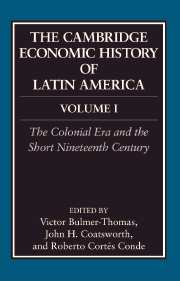Book contents
- Frontmatter
- Introduction
- Part I The Economic Background
- Part II Natural Resources and Factor Endowments
- Part III Economic Organization and Sectoral Performance
- 7 Political Economy and Economic Organization
- 8 Agriculture and Land Tenure
- 9 The Mining Industry
- 10 Premodern Manufacturing
- 11 Commercial Monopolies and External Trade
- 12 Money, Taxes, and Finance
- Part IV The Economic Impact of Independence
- Bibliographical Essays
- Index
- References
11 - Commercial Monopolies and External Trade
from Part III - Economic Organization and Sectoral Performance
Published online by Cambridge University Press: 28 March 2008
- Frontmatter
- Introduction
- Part I The Economic Background
- Part II Natural Resources and Factor Endowments
- Part III Economic Organization and Sectoral Performance
- 7 Political Economy and Economic Organization
- 8 Agriculture and Land Tenure
- 9 The Mining Industry
- 10 Premodern Manufacturing
- 11 Commercial Monopolies and External Trade
- 12 Money, Taxes, and Finance
- Part IV The Economic Impact of Independence
- Bibliographical Essays
- Index
- References
Summary
INTRODUCTION
The first image that comes to mind when one thinks of trade in Latin America during the colonial period is that of the Spanish imperial trade monopoly with its axis in the Casa de Contratación in Seville. The accumulation of precious metals by means of trade surpluses was the chief mercantilist idea behind the monopolistic control of trade that Spain and Portugal imposed on their colonies. The success of this type of monopoly depended to a great extent on the mother country’s ability to acquire exclusive rights to the gains from trade through regulations and trade restrictions. In practice, such monopolies were difficult to enforce and the gains often elusive. The colonial trading system had problems from its inception and was constantly subject to external pressures, which meant that the system became less and less functional as time progressed. During the sixteenth and seventeenth centuries, the rigidity of the trade system imposed high transaction costs for consumers in the colonies, who paid higher prices for imported goods. The reforms implemented in the eighteenth century eliminated some of the trade restrictions on trans-Atlantic trade, but imperial policies continued to distort the prices and volume of trade in Latin America.
- Type
- Chapter
- Information
- The Cambridge Economic History of Latin America , pp. 395 - 422Publisher: Cambridge University PressPrint publication year: 2005
References
- 1
- Cited by



